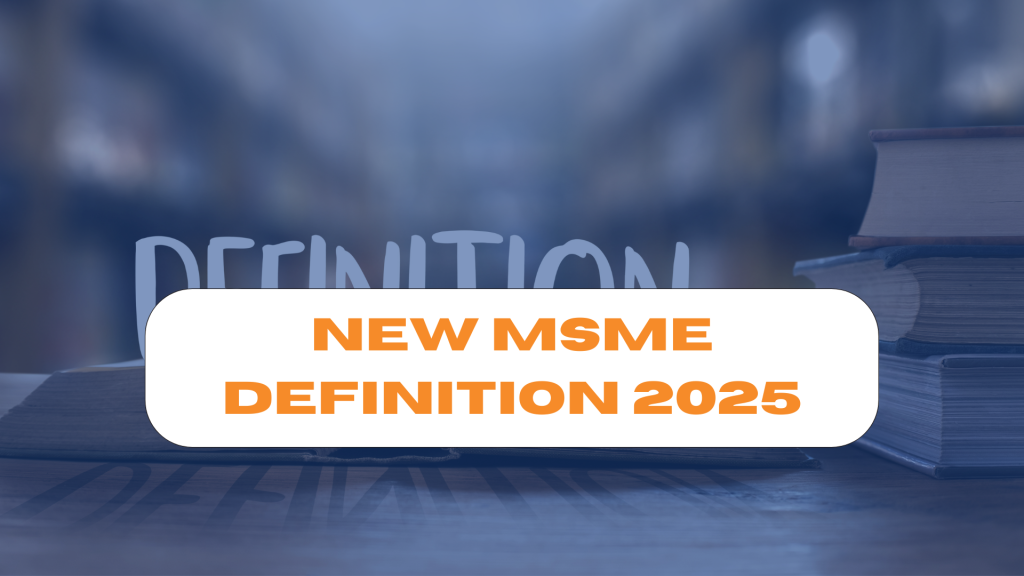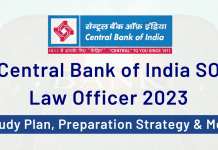The Micro, Small, and Medium Enterprises (MSME) sector is the backbone of the Indian economy, contributing significantly to GDP, employment generation, and exports. As the government prepares to revise the MSME definition in 2025, it is crucial to analyze its far-reaching impact on various economic aspects, including government policies, financial inclusion, and industrial growth. This revision is expected to align with the objectives of the Union Budget 2025, further strengthening India’s economic framework and driving long-term growth.
Why is the MSME Definition Revision Important?
The MSME definition plays a pivotal role in determining the eligibility of enterprises for various benefits, subsidies, and priority lending schemes. The last revision in 2020 redefined MSMEs based on both investment and turnover, allowing for a more dynamic and inclusive approach. However, rapid economic changes, inflation, and evolving market dynamics necessitate another revision to ensure that MSMEs continue to thrive and contribute effectively to India’s economic growth.

Old MSME Definition
Before the 2025 revision, MSMEs were classified based on their investment in plant and machinery (for manufacturing enterprises) or equipment (for service enterprises). The thresholds were significantly lower, which often restricted businesses from growing while still retaining MSME benefits. Below is the classification as per the old definition:
Manufacturing Sector
| Enterprises | Investment in Plant & Machinery |
|---|---|
| Micro enterprises | ≤ ₹25 lakh |
| Small enterprises | > ₹25 lakh but < ₹5 crore |
| Medium enterprises | > ₹5 crore but < ₹10 crore |
Services Sector
| Enterprises | Investment in Equipment |
|---|---|
| Micro enterprises | ≤ ₹10 lakh |
| Small enterprises | > ₹10 lakh but < ₹2 crore |
| Medium enterprises | > ₹2 crore but < ₹5 crore |
While this definition served well for years, it became outdated as businesses grew but struggled to retain MSME benefits due to restrictive investment limits. Additionally, it did not account for turnover, which is a crucial indicator of business size and financial health.
New MSME Definition (Post-2025)
Now the government has introduced a revised MSME definition that incorporates both investment and turnover criteria. This change allows businesses to expand while continuing to avail MSME benefits, thereby fostering growth and economic resilience. The new classification is as follows:
| Enterprise Category | Current Investment Limit | Revised Investment Limit | Current Turnover Limit | Revised Turnover Limit |
|---|---|---|---|---|
| Micro Enterprise | ₹1 crore | ₹2.5 crore | ₹5 crore | ₹10 crore |
| Small Enterprise | ₹10 crore | ₹25 crore | ₹50 crore | ₹100 crore |
| Medium Enterprise | ₹50 crore | ₹125 crore | ₹250 crore | ₹500 crore |
Key Drivers for the 2025 MSME Definition Revision
- Economic Growth and Inflation: With inflation and production costs rising, many enterprises that previously fell within the MSME bracket have outgrown the existing limits. The new definition is expected to accommodate these changes, ensuring that deserving businesses continue to receive benefits.
- Global Trade and Export Competitiveness: MSMEs contribute nearly 45% to India’s total exports. A revised definition could provide them with better access to credit, technology upgrades, and incentives to compete in international markets.
- Alignment with the Union Budget 2025: The Union Budget 2025 is expected to introduce policies that further enhance financial assistance, digitalization, and sustainability efforts for MSMEs. A revised definition could ensure greater policy synchronization.
Implications of the MSME Definition Revision on the Indian Economy
1. Increased Access to Credit and Financial Inclusion
One of the major challenges for MSMEs has been access to credit. With an updated classification, more enterprises will fall under the MSME category, making them eligible for government-backed loans and financial support schemes such as the Credit Guarantee Fund Scheme for Micro and Small Enterprises (CGTMSE) and the Emergency Credit Line Guarantee Scheme (ECLGS). This revision could significantly boost financial inclusion, allowing smaller businesses to scale up operations and contribute more effectively to economic growth.
2. Impact on Employment Generation and Workforce Expansion
The MSME sector is one of the largest job providers in India, employing over 110 million people. An expansion in the MSME classification could lead to increased hiring, particularly in rural and semi-urban areas, supporting the government’s employment generation agenda. Additionally, the Union Budget 2025 might introduce new skill development initiatives tailored to MSMEs, fostering a more skilled workforce.
3. Strengthening the ‘Make in India’ and ‘Atmanirbhar Bharat’ Initiatives
Revising the MSME definition will play a crucial role in advancing the government’s flagship initiatives like ‘Make in India’ and ‘Atmanirbhar Bharat.’ By enabling a larger number of enterprises to avail benefits such as reduced compliance burdens, lower tax rates, and easier access to credit, India can bolster its domestic manufacturing capacity and reduce dependency on imports. This move could also attract more foreign investments into India’s MSME sector, creating new economic opportunities.
4. Boost to Digital Transformation and Technological Innovation
With the rapid digitalization of the economy, MSMEs need better access to technology, digital payment systems, and e-commerce platforms. The Union Budget 2025 is expected to allocate funds for digital infrastructure development. An updated MSME definition that incorporates digital enterprises could help bring more businesses into the formal economy, thereby increasing tax compliance and revenue generation.
5. Encouragement of Sustainable and Green Practices
The government has been focusing on sustainability and green initiatives, particularly in the MSME sector. The revised definition could encourage more MSMEs to adopt environmentally friendly practices by making them eligible for green financing and incentives. This shift aligns with India’s commitments to global climate goals and sustainable development targets.
6. Implications for Taxation and Regulatory Compliance
A reclassification of MSMEs could lead to changes in tax structures and compliance requirements. For instance, businesses that were previously categorized as ‘small’ but now fall under ‘medium’ might face different GST and income tax obligations. The Union Budget 2025 is expected to address these concerns by streamlining tax benefits and reducing compliance burdens for MSMEs, ensuring a smoother transition for businesses affected by the definition change.
7. Strengthening Rural and Agri-Based MSMEs
Agriculture-based MSMEs play a vital role in rural development and employment. A revised MSME definition could provide additional support to these enterprises through enhanced credit access, better infrastructure, and government subsidies. This move would align with the government’s focus on rural economic growth and self-reliance.
Potential Challenges of the MSME Definition Revision
While the revision is expected to bring significant benefits, certain challenges must be addressed:
- Risk of Policy Misuse: Larger enterprises might attempt to restructure their businesses to qualify as MSMEs and take undue advantage of government benefits.
- Administrative and Compliance Adjustments: Existing schemes and policies will need to be updated to reflect the new classification, which could create temporary bureaucratic hurdles.
- Sectoral Disparities: The impact of the revised definition may vary across different industries, requiring sector-specific policy interventions.
Conclusion
The 2025 MSME definition revision is set to be a transformational policy shift that will shape the future of small and medium enterprises in India. By aligning with the objectives of the Union Budget 2025 and addressing the evolving economic landscape, this revision can enhance credit accessibility, boost employment, promote sustainability, and strengthen India’s position in the global market. However, careful implementation and monitoring will be essential to ensure that the benefits reach the right enterprises and drive holistic economic growth.
With the Indian economy on a path of rapid development, the MSME sector stands to play an even greater role in shaping its trajectory. This upcoming revision, if executed effectively, could mark the beginning of a new era of resilience, innovation, and prosperity for India’s micro, small, and medium enterprises.
At ixamBee, we specialize in providing comprehensive online courses for government exams and online courses for government jobs. Our expertly designed courses for government jobs cater to a wide range of upcoming government exams. Whether you’re preparing for specific courses for government exams or seeking general guidance, ixamBee offers the resources like Beepedia previous year papers, SSC CGL, SSC CHSL, SSC MTS and other mock tests to succeed in exams like RBI Grade B, SEBI Grade A, NABARD Grade A, RRB NTPC, SSC MTS, NIACL Assistant, and more.













